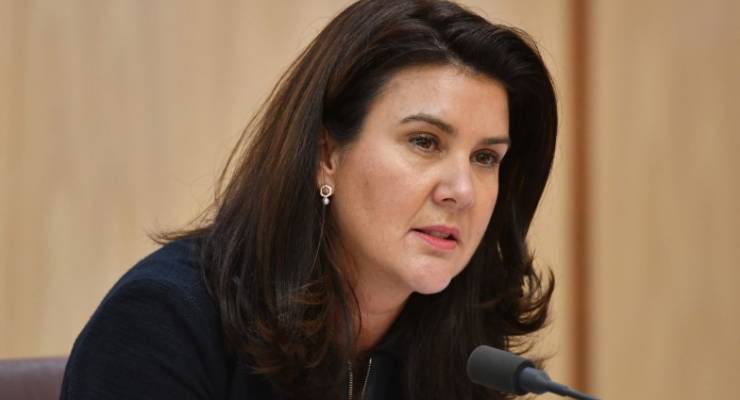
Strange how industry super funds — and increasingly, the whole superannuation industry — are both an enemy to be smitten hip and thigh for the Liberal Party, and a saviour of the economy, when convenient.
Yesterday, as part of his grand 10-year manufacturing plan and its $1.3 billion business slush fund, Scott Morrison called for a Team Australia moment, saying “our government is determined to set a 10-year time horizon under this strategy where all parties — industry, workforce including unions, governments at all levels, capital including superannuation funds and our scientific and research community — are pulling together in the one direction”.
So, super funds, including the largest sub-sector, industry super, ought to get with the manufacturing program to help create 80,000 jobs in the government’s winner-picked industries, including mining companies.
That echoes Treasurer Josh Frydenberg, who in June called on super funds to invest domestically — albeit in infrastructure rather than manufacturing — to address the disastrous slump in investment this year on already low levels in 2019.
“Superannuation is a massive pool in savings that should be harnessed more for domestic investment,” he said. “And I don’t care if they are industry funds or retail funds, I would like to see them both put to work on domestic infrastructure assets more than they have been.”
We later learnt that Industry Super Australia chair Greg Combet had been offering for months to collaborate with the government in targeted investment to help the economic recovery.
So, everyone’s on the same page — industry super funds should be working with the government to target investments in key areas as part of the recovery.
Well, except for Frydenberg’s junior minister Jane Hume, a dedicated hater of the industry super funds she notionally regulates, who thinks that’s the last thing industry funds should be doing.
“They seem to forget their job isn’t to rebuild the economy or create jobs,” Hume said about industry funds in an attack on them a fortnight ago, when she described them as “the most noisy, most belligerent, most resistant to change or improvement and they are also by far the most well-funded lobby group around”.
So, whom should super funds listen to? Scott Morrison and Josh Frydenberg, or Jane Hume?
An explanation assuming coherence within the government would suggest Morrison and Frydenberg are the adults in the room while junior ideologues like Hume, Tim Wilson and former retail super fund spruiker Andrew Bragg pursue the Liberal culture war against the hated industry sector.
An alternative explanation is that, such is the blind hatred of the Liberal Party for industry super, the government is prepared even to undermine a key source of investment as part of its vendettas.
The government has form in blithely ignoring industry super investment in its preferred areas while castigating the sector. Morrison himself attacked the industry sector in 2016 for not investing in Australian infrastructure, the day before data emerged showing industry funds streets ahead of bank-owned funds in their levels of investment in infrastructure. Industry funds then saved Morrison’s bacon when they bought Ausgrid.
(These days, critics claim, infrastructure investment is evidence of poor management by industry funds, because it’s not liquid enough to enable them to pay out people seeking early access to their super, which was quickly discredited.)
Industry super funds have been crucial to driving investment in Australian start-ups, at least according to the normally anti-industry super Financial Review. The AFR’s Ben Potter reinforced the point yesterday in response to Morrison’s manufacturing policy, noting the role of super investment in areas like biotech and pharmaceuticals.
Clearly they haven’t been listening to Hume.








You know we’ve reached gender equality when the Liberal women are as stupid as their men.
One must assume that Hume, a hole within a vacancy, within an emptiness, within a vacuum, like so many of her colleagues, has been sent out to skirmish, bite, threaten, confuse, dodge and weave.., why? It is clear that industry funds are good, superior, more effective, more honest, than the profiteering political perverts of money gouging elsewhere in this lucrative industry. Why do thieves check out and rob banks?? Because…that’s where the money is.., and so, it follows that a conservative bumboy government must give relief to its donors, its class, its mates. Let superannuation payers select their own preferred fund and investment system, with the nation’s good first, not greed for the manipulating fee and deal cheats who have been exposed so often.
80,000 jobs? Is that over 10 years? That doesn’t seem like a lot.
Having had what super I had stolen by fees and charges and in my mid fifties ie stuck on the Dole until pension age, I welcome the company here in poverty.
Recovery? Pull the other one: it plays ‘back in black’.
Soon to be ‘ paint it black’.
And it isn’t just industry super funds about which the government is speaking with forked tongues and personas. Morrison called on “our scientific and research community” to be part of (cringe) Team Australia, while at the same time starving universities and attempting to stop them using general funds for research.
Team Australia didn’t work with Abbott, and it won’t work now with Morrison.